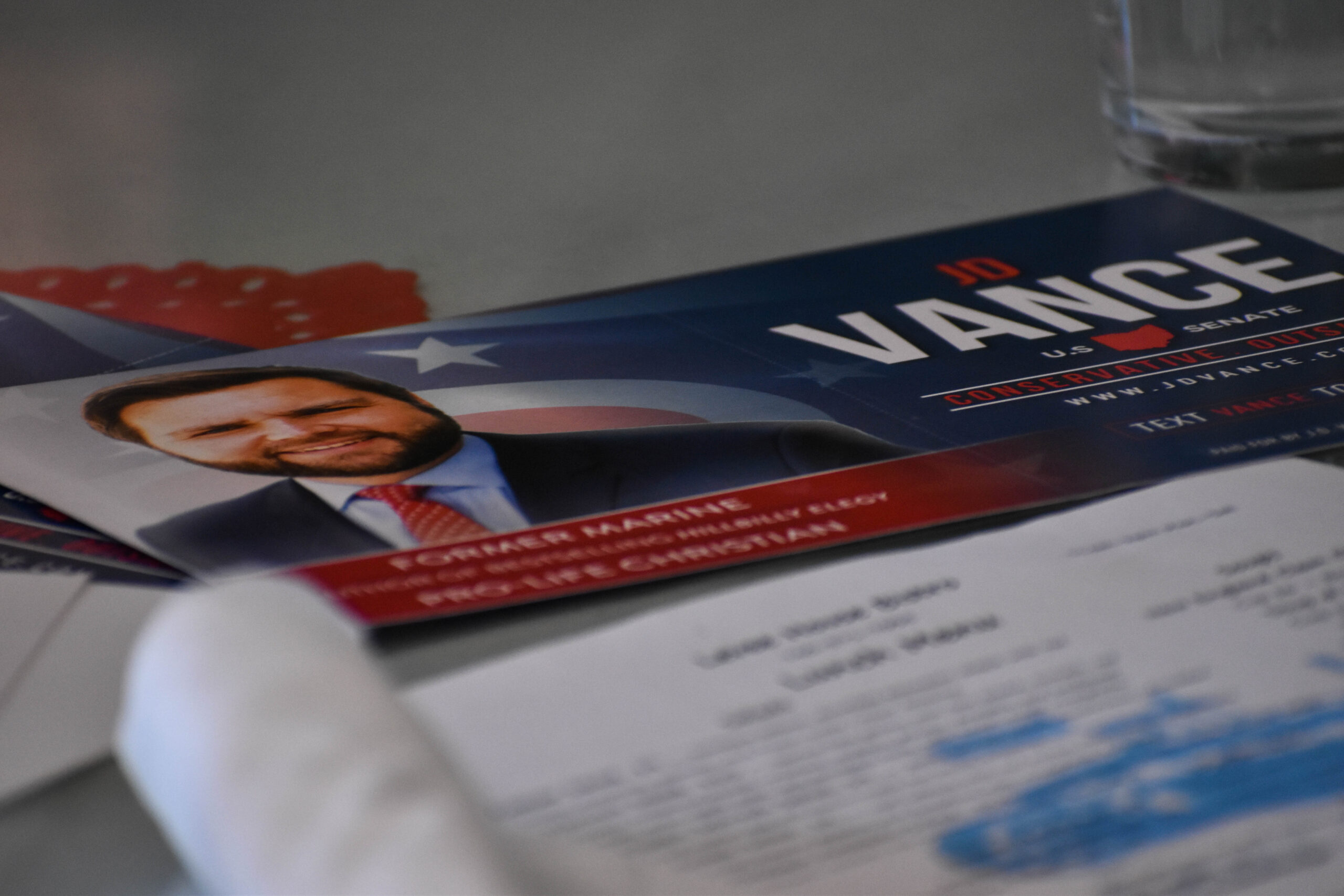
The words of J.D. Vance, the author, and J.D. Vance, the candidate, just don’t read the same.
After publishing his widely read and regularly criticized memoir Hillbilly Elegy: A Memoir of a Family and Culture in Crisis in 2016, Vance catapulted into the public eye.
The Southwest Ohio native from Middletown — an alumnus of the Marines, Ohio State University and Yale Law School — appeared regularly for sit-down interviews and as a cable commentator with what he deemed answers to questions Americans have about rural regions.
He moved back to Ohio in 2017.
And in February 2022, nearly five years later, Vance is running to be the GOP nominee for the U.S. Senate race in the state.
An hour in Marietta
Levee House Bistro in Marietta sits just above the Ohio River. Diners inside can look across the water to neighboring state West Virginia from a seat by the bank of windows near the restaurant’s entrance.
On Feb. 16, a long table by those windows — reserved for Vance and voters — was the only one occupied, beyond two opposite the room taken by a few younger campaign organizers traveling with Vance.
The midday conversation between him and a dozen people who showed fights for dominance over the clanging of silverware back in the kitchen as daytime workers scrub dishes.
A barge on the water outside carries loads of resources a few miles downstream to a colony of power plants. Inside, talk centers on a few central themes: public schools and the hot-button critical race theory, the economy and jobs, and gridlock in Washington, D.C.
It’s Vance’s second event of the day and his 24th since January.
Vance on Tour
The candidate has zigzagged around Ohio on what he’s branded the “No BS Tour,” intimate town halls that seem to draw 10 or so people per event.
That same morning, just a few hours before, the Cincinnati Enquirer broke the news: Outgoing U.S. Sen. Rob Portman endorsed Jane Timken in the GOP primary for the seat he currently holds.
In this crowded field of pro-Donald Trump candidates — and in mid-February, when this race is still absent an endorsement by the man himself — Portman’s word had to carry some weight.
But nothing like the former president’s word will, Vance says when asked.
“Look, at the end of the day, I’m not surprised that Rob Portman endorsed Jane Timken because I’m not trying to be a senator like Rob Portman,” Vance says, adding that he sees Portman and Timken as moderate.
Vance’s Shift to the Right of the GOP
One of Vance’s big endorsements, so far, is that of Rep. Marjorie Taylor Greene.
Greene, a freshman lawmaker from Georgia, regularly makes headlines in Washington, D.C., for everything from refusals to wear a mask in the halls of Congress, verbal altercations with other lawmakers and antisemitic remarks about the Holocaust.
In his shift to the far right, Vance has welcomed Greene’s endorsement, even after backlash over a rally she joined him at in the suburbs of Cincinnati.
Once vocally critical of the previous president, Vance now shrugs that off as he tries to defend his position today, voicing that he’s squarely behind former U.S. President Trump.
“I’ve been very open about this fact: I was a late adopter of Donald Trump,” he says to those in Levee House Bistro, in reference to an anti-Vance advertisement by the Club for Growth that highlights older comments made by the candidate about Trump.
When Vance is asked about political campaign finances that Wednesday, he says he sees “real problems” with the money flowing in and out of politics, yielding too much power to large companies and corporations.
But Vance himself previously received $10 million from PayPal co-founder and billionaire Peter Thiel via the Protect Ohio Values PAC, according to the Cincinnati Enquirer.
Has Vance resonated in rural Ohio?
“I’m committed. I’m committed, and I told (Ohio Sen.) Matt Dolan that the other day,” Washington County Job and Family Services Director Flite Freimann says to Vance about settling on a candidate.
Vance has had fierce critics in the region he calls home long before he added “candidate for public office” to his professional resume.
Although his book likely propelled him into running for public office, many Appalachians have called foul on the last four words in the title: “A culture in crisis.”
Vance’s memoir is rooted in stories of his abuse as a child, his mother’s battle with addiction and his “Mamaw,” who raised him. But his critics in Appalachia have said what he prescribes for the rest of Appalachia is a pill too one-size-fits-all for a diverse region touching 13 states.
It’s been illustrated in everything from regular negative posts by local podcasters on Twitter to entire books such as Appalachian Reckoning: A Region Responds to Hillbilly Elegy.
As a candidate, Vance talks briefly about how he wants to see investments in Appalachia, though he doesn’t go into detail that day about policies he’d prioritize if he makes it to the Senate.
“I won’t forget the region, and I won’t forget the people who live here. There’s this idea going around elite circles that Appalachia is done,” Vance says in an interview after the event. “That the proper response to economic problems in the region is for everybody to get the hell out, get a U-Haul and move to somewhere else.”
About halfway through that event Wednesday, Vance asks if everyone in the room has settled on a candidate.
Other than Freimann, nobody chimes in.
